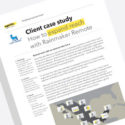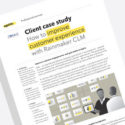5 Ways to Boost Medical Device Sales Training and Destroy the Competition
 |
Mads Bjarni-Kornbech VP, Global Marketing Life Sciences & Regional Head |
Are you struggling to deliver effective medical device sales training to your teams?
Delivering the training is often easy; it is hard to provide it effectively with sufficient reinforcement.
Sales reps must learn complex products and medical information in the medical device industry and have higher-level dialogs with their customers. Additionally, since the healthcare system is heavily regulated, reps must comply with changing rules while delivering results. Due to market consolidations and acquisitions, medical device reps must be agile and constantly learn about new products throughout their careers.
In this post, I will share a few tips I have learned over the years and advice gathered from others I work with here at Agnitio, in our parent company, Bigtincan, and from our sibling company Brainshark, which is also a Bigtincan Company.
Consultative Selling versus Hard Sells
Medical device sales is a very different ballgame from other fields. Sales reps in this industry may know their products but surgeons, physicians, and other healthcare professionals are the real experts. The key to effective medical device selling is consultative selling.
Consultative selling empowers relationship-based partnerships focused on identifying and suggesting solutions to customer needs. Hard sells do not work well in a highly regulated industry where unsubstantiated claims are unethical and potentially dangerous for patients.
For example, sales reps selling surgical robots need to know product specifications, features and benefits, competitive advantages, and data to support their claims. However, your reps cannot say, "use this robot so that your patients recover faster," or "this robot can help your patients run marathons after surgery." Many clinical, physiological, lifestyle, age, and genetic factors ultimately impact how patients feel and recover after surgery. Additionally, the skill of the operating surgeon is a significant factor influencing success. The robot is but a tiny cog in the entire process.
Medical device reps need to master the consultative selling process. This process involves a sequence of open-ended questions in a dialog to understand their customers’ needs and demonstrate real value.
Review this brief article for other approaches for consultative selling.
Drive Hands-On Training
– attributed to Confucius
Empower your reps for success. Successful medical device reps are experts at juggling many priorities at the same time. They are great at quickly assimilating new information and applying it in a practical situation. Many are tactile learners who prefer learning by doing. But traditionally, sales training for medical device reps involved a week or two of intense, mainly academic lectures in a classroom setting, or "death by PowerPoint."
Role-plays, interactive exercises, competitive games, simulation training, objection handling, and more can reinforce training. Try to simulate real-world situations as far as possible. If the product is complex, make sure the training session allocates enough time to understand the equipment, assembly, and other necessary details.
Simulation-Based Training All Year Round
Nowadays, there are new, exciting tools to help reps experience interactive learning all year round. Augmented Reality (AR) goggles can project virtual information onto real-world visuals. Using this technology, sellers can learn to navigate complex medical procedures, understand their customers' challenges, and learn precisely how customers use their products.
Virtual Reality (VR) takes training another step further. Virtual Reality technology is used to simulate entire alternate realities. Using VR, sales trainers can develop simulations to mimic various complex scenarios that reps may face on the job – just like flight simulators for pilot training. VR can create a virtual simulation of a complex medical device product for the rep to assemble or develop artificial scenarios to plan their sales calls better.
For example, reps learning to sell medical devices like PET-CTs or other large, capital-intensive equipment will not have the luxury of working with physical samples. Until now, most of the training of these types of equipment is through didactic instruction, video demonstrations, or animations. With AR and VR, reps can get a more interactive learning experience to help memory recall and elevate sales conversations, even in remote locations.
Offer Mobile-Based Learning Reinforcement
Medical device reps are road warriors. They spend most of their time in their cars and at hospitals. Mandating elaborate iPad or laptop-based video training is impractical and a burden more than a boon. Instead, mobile-friendly learning reinforcement offered in various formats will prove more useful and appeal to all types of learning styles.
Remember, your sales reps are highly competitive and are always looking for a competitive advantage to hit their sales targets. Why not offer a podcast on the best conversation starters for a new product launch that they can listen to as they drive? Or how about a series of short, informative audio files on the latest clinical data they need to know about, or a primer about competitive products?
![]()
Leverage Interactive Gaming To Engage and Test
Good sales reps love competition. Enhance their learning through engaging, interactive gaming apps. Apart from product features and benefits training, this type of instruction is excellent for subjects that tend to be a little dry but are essential – like regulatory and compliance requirements. You can encourage healthy competition between sales branches by displaying scores on a shared leaderboard. Remember to add attractive incentives as well for the high-performing branches and reps.
An added benefit of game-based training is instant feedback on what works and where reps struggle. For example, suppose 70% of your reps across the country get questions in a particular category wrong. In that case, this serves as a red flag. Sales enablement professionals can analyze why the topic was challenging and adjust learning programs and tools accordingly.
Through in-person and digital technology, interactive, blended learning programs can help sales enhancement teams enrich the medical device sales training process.
Final thoughts
Again, sales training is easy to deliver but not to deliver effectively and in a manner that helps sellers do their jobs well.
Consider the tips in this article, and if you found them of value, you can read this post for more tips for delivering effective sales training.
![]()
Never miss a thing
Join our email mailing list and receive all Agnitio articles and digital marketing guides as soon as they are published.










